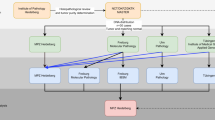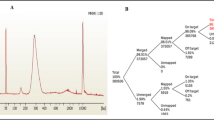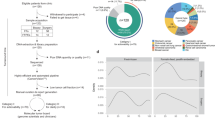Abstract
Developments in genomics, including next-generation sequencing technologies, are expected to enable a more personalized approach to clinical care, with improved risk stratification and treatment selection. In oncology, personalized medicine is particularly advanced and increasingly used to identify oncogenic variants in tumor tissue that predict responsiveness to specific drugs. Yet, the translational research needed to validate these technologies will be conducted in patients with late-stage cancer and is expected to produce results of variable clinical significance and incidentally identify genetic risks. To explore the experiential context in which much of personalized cancer care will be developed and evaluated, we conducted a qualitative interview study alongside a pilot feasibility study of targeted DNA sequencing of metastatic tumor biopsies in adult patients with advanced solid malignancies. We recruited 29/73 patients and 14/17 physicians; transcripts from semi-structured interviews were analyzed for thematic patterns using an interpretive descriptive approach. Patient hopes of benefit from research participation were enhanced by the promise of novel and targeted treatment but challenged by non-findings or by limited access to relevant trials. Family obligations informed a willingness to receive genetic information, which was perceived as burdensome given disease stage or as inconsequential given faced challenges. Physicians were optimistic about long-term potential but conservative about immediate benefits and mindful of elevated patient expectations; consent and counseling processes were expected to mitigate challenges from incidental findings. These findings suggest the need for information and decision tools to support physicians in communicating realistic prospects of benefit, and for cautious approaches to the generation of incidental genetic information.
Similar content being viewed by others
Log in or create a free account to read this content
Gain free access to this article, as well as selected content from this journal and more on nature.com
or
References
Hamburg M, Collins F : The path to personalized medicine. N Engl J Med 2010; 363: 301–304.
Chan I, Ginsburg G : Personalized medicine: progress and promise. Annu Rev Genomics Hum Genet 2011; 12: 217–244.
Borden E, Raghavan D : Personalizing medicine for cancer: the next decade. Nat Rev Drug Discov 2010; 9: 343–344.
Schlisky R : Personalized medicine in oncology: the future is now. Nat Rev Drug Discov 2010; 9: 363–366.
Roychowdhury S, Iyer M, Robinson D et al: Personalized oncology through integrative high-throughput sequencing: a pilot study. Sci Transl Med 2011; 3: 111ra21.
Wideroff L, Phillips K, Randahawa G et al: A health services research agenda for cellular, molecular and genomic technologies in cancer care. Public Health Genomics 2009; 12: 233–244.
Kwon S, Cho H, Choi J, Jee B, Jo Y, Woo H : Perspectives of integrative cancer genomics in next generation sequencing era. Genomics Inform 2012; 10: 69–73.
Facio F, Brooks S, Loewenstein J, Green S, Biesecker L, Biesecker B : Motivators for participation in a whole-genome sequencing study: implications for translational genomics research. Eur J Hum Genet 2011; 19: 1213–1217.
Kohane E, Hsing M, Kong S : Taxonomizing, sizing and overcoming the incidentalome. Genet Med 2012; 14: 399–404.
Ku C-S, Wu M, Cooper D et al: Technological advances in DNA sequence enrichment and sequencing for germline genetic diagnosis. Expert Rev Mol Diagn 2012; 12: 159–173.
Green RC, Berg JS, Grody WW et al: ACMG recommendations for reporting of incidental findings in clinical exome and genome sequencing. Genet Med 2013; 15: 565–574.
van El C, Cornel M, Borry P et al: Whole-genome sequencing in health care: recommendations of the European Society of Human Genetics. Eur J Hum Genet 2013; 21: 580–584.
Matsuyama R, Reddy S, Smith T : Why do patients choose chemotherapy near the end of life? A review of the perspective of those facing death from cancer. J Clin Oncol 2006; 24: 3490–3496.
McClement S, Chochinov H : Hope in advanced cancer patients. Eur J Cancer 2008; 44: 1169–1174.
Sulmasy D, Astrow A, He M et al: The culture of faith and hope: patients' justifications for their high estimations of expected therapeutic benefit when enrolling in early phase oncology trials. Cancer 2010; 116: 3702–3711.
Wootten A, Abbott J, Siddons H, Rosenthal M, Costello A : A qualitative assessment of the experience of participating in a cancer-related clinical trial. Support Care Cancer 2011; 19: 49–55.
Pelligrini I, Rapti M, Extra J-M et al: Tailored chemotherapy based on tumour gene expression analysis: breast cancer patients' misinterpretaitons and positive attitudes. Eur J Cancer Care 2012; 21: 242–250.
Bueno-de-Mesquita J, van Harten W, Retel V et al: Use of 70-gene signature to predict prognosis of patients with node-negative breast cancer: a prospective community-based feasibility study (RASTER). Lancet Oncol 2007; 8: 1079–1087.
Oratz R, Paul D, Cohn A, Sedlacek S : Impact of a commercial reference laboratory test recurrence score on decision making in early-stage breast cancer. J Oncol Pract 2007; 3: 182–287.
Lo S, Mumby P, Norton J et al: Prospective multicenter study of the impact of the 21-Gene Recurrence Score Assay on medical oncologist and patient adjuvant breast cancer treatment selection. J Clin Oncol 2010; 28: 1671–1676.
Bonter K, Desjardins C, Currier N, Pun J, Ashbury F : Personalised medicine in Canada: a survey of adoption and practice in oncology, cardiology and family medicine. BMJ Open 2011; 1: e000110.
O'Neill S, Brewer N, Lillie S et al: Women's interest in gene expression analysis for breast cancer recurrence risk. J Clin Oncol 2007; 25: 4628–4634.
Andrykowski M, Burris J, Walsh E, Small B, Jacobsen P : Attitudes toward information about genetic risk for cognitive impairment after cancer chemotherapy: Breast cancer survivors compared with healthy controls. J Clin Oncol 2010; 28: 3442–3447.
McClellan K, Avard D, Simard J, Knoppers B : Personalized medicine and access to health care: potential for inequitable access? Eur J Hum Genet 2013; 21: 143–147.
Facio F, Eidem H, Fisher T et al: Intentions to receive individual results from whole-genome sequencing among participants in the ClinSeq study. Eur J Hum Genet 2013; 21: 261–265.
Issa A, Tufail W, Hutchinson J, Tenorio J, Poonam Baliga M : Assessing patient readiness for the clinical adoption of personalized medicine. Public Health Genomics 2009; 12: 163–169.
Gordon E, Griffin G, Wawak L, Pang H, Gollust S, Bernhardt B : "It's not like judgment day": public understanding of and reactions to personalized genomic risk information. J Genet Couns 2012; 21: 432–432.
Schwartz M, Peshkin B, Hughes C, Main D, Isaacs C, Lerman C : Impact of BRCA1/BRCA2 mutation testing on psychologic distress in a clinic-based sample. J Clin Oncol 2002; 20: 514–520.
Lerman C, Narod S, Schulman K et al: BRCA1 testing in families with hereditary breast-ovarian cancer: a prospective study. JAMA 1996; 275: 1885–1892.
Croyle R, Smith K, Botkin J, Baty B, Nash J : Psychological responses to BRCA1 mutation testing: preliminary findings. Health Psychol 1997; 16: 63–72.
Broadstock M, Michie S, Marteau T : Psychological consequences of predictive genetic testing: a systematic review. Eur J Hum Genet 2000; 8: 731–738.
Hallowell N : Doing the right thing: genetic risk and responsibility. Sociol Health Illn 1999; 21: 597–621.
Hallowell N, Foster C, Eeles R, Ardern-Jones A, Murday V, Watson M : Balancing autonomy and responsibility: the ethics of generating and disclosing genetic information. J Med Ethics 2003; 29: 74–83.
Hallowell N, Ardern-Jones A, Eeles R et al: Guilt, blame and responsibility: men's understanding of their role in the transmission of BRCA1/2 mutations within their family. Sociol Health Illn 2006; 28: 969–988.
Etchegary H, Miller F, de Laat S, Wilson B, Carroll J, Cappelli M : Decision-making about inherited cancer risk: exploring dimensinos of genetic responsibility. J Genet Couns 2009; 18: 252–264.
Metcalfe K, Poll A, Royer R et al: Screening for founder mutations in BRCA1 and BRCA2 in unselected jewish women. J Clin Oncol 2010; 28: 387–391.
Tran B, Brown A, Bedard P et al: Feasibility of real time next generation sequencing of cancer genes linked to drug response: results from a clinical trial. Int J Cancer Supp 2013; 132: 1547–1555.
Sandelowski M : What's in a name? Qualitative description revisited. Res Nurs Health 2010; 33: 77–84.
Thorne S : Interpretive description. Walnut Creek, CA, USA: Left Coast Press, 2008.
Charmaz K : Constructivist and objectivist grounded theory; In: Denzin N, Lincoln Y editors.: The SAGE handbook of qualitative research. Thousand Oaks, CA, USA: Sage, 2000.
Charmaz K : Constructing grounded theory: a practical guide through qualitative analysis. London, UK: Sage, 2006.
Hallowell N, Cooke S, Crawford G, Lucassen A, Parker M : Distinguishing research from clinical care in cancer genetics: theoretical justifications and practical strategies. Soc Sci Med 2009; 68: 2010–2017.
Forrest K, Simpson S, Wilson B et al: To tell or not to tell: Barriers and facilitators in family communication about genetic risk. Clin Genet 2003; 64: 317–326.
Wilson B, Etchegary H. : Family communication of genomic information; In: Teryack K editor. Handbook of genomics and the family: Psychosocial context for children and adolescents. New York, NY, USA: Springer, 2010.
Acknowledgements
We thank the Ontario Institute for Cancer Research for funding and our physician participants for sharing time and expertise. We also thank the patients who, despite being gravely ill, gave generously of their time to share their experiences.
Author information
Authors and Affiliations
Corresponding author
Ethics declarations
Competing interests
The authors declare no conflict of interest.
Additional information
Supplementary Information accompanies this paper on European Journal of Human Genetics website
Supplementary information
Rights and permissions
About this article
Cite this article
Miller, F., Hayeems, R., Bytautas, J. et al. Testing personalized medicine: patient and physician expectations of next-generation genomic sequencing in late-stage cancer care. Eur J Hum Genet 22, 391–395 (2014). https://doi.org/10.1038/ejhg.2013.158
Received:
Revised:
Accepted:
Published:
Issue date:
DOI: https://doi.org/10.1038/ejhg.2013.158
Keywords
This article is cited by
-
Determinants of targeted cancer therapy use in community oncology practice: a qualitative study using the Theoretical Domains Framework and Rummler-Brache process mapping
Implementation Science Communications (2023)
-
The Impact of an Educational Video in Arabic Language on Patients’ Knowledge and Attitudes Towards Genetic Testing for Cancer Therapy
Journal of Cancer Education (2023)
-
Investigating acceptability of a training programme in precision medicine for frontline healthcare professionals: a mixed methods study
BMC Medical Education (2022)
-
Physicians’ perceptions of the factors influencing disclosure of secondary findings in tumour genomic profiling in Japan: a qualitative study
European Journal of Human Genetics (2022)
-
Genomic Testing for Relapsed and Refractory Lymphoid Cancers: Understanding Patient Values
The Patient - Patient-Centered Outcomes Research (2021)



